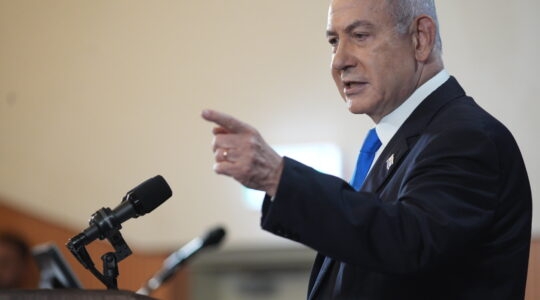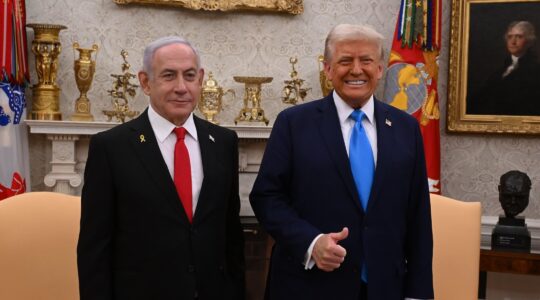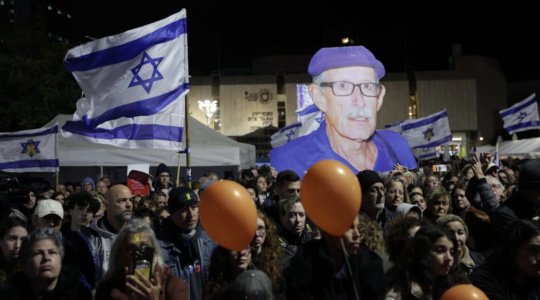NEWS ANALYSIS
JERUSALEM (JTA) — With Israel’s war in Gaza in its third week, it’s clear the outcome could have far-reaching regional implications.
If the operation against Hamas is successful, Israel will have struck a blow against the region’s radical anti-Western, Iran-led axis. But scores of angry demonstrations across the Middle East point to an inherent paradox in its use of force in Gaza: The harder Israel hits the radicals, the more the region is radicalized.
Already the war has heightened longstanding tensions between radical Shi’ite Iran and moderate Sunni-led Egypt. Meanwhile, Turkey, viewed by Israel as a strategic partner, has adopted a surprisingly tough anti-Israel stance.
One of the key open questions is whether Iran will try to open a second front against Israel through its Hezbollah proxy in Lebanon.
Surely the main regional player in any new cease-fire arrangement will be Egypt. The major spoiler may be Iran.
The exacerbation of the moderate-radical divide also could have a profound effect on Arab-Israeli peacemaking by giving extremists a virtual veto over Israeli-Palestinian and Israeli-Syrian peace efforts.
Conversely, it might concentrate moderate Arab minds and actually accelerate peacemaking.
Israeli President Shimon Peres suggested something of the kind when he said most moderate Arab leaders actually were hoping for an Israeli victory over Hamas.
"They don’t want to see 35 million Iranians ruling over 350 million Arabs," he said.
Much will depend on how the Egyptian government weathers the storm of abuse it has been facing in the region and at home.
Egypt’s dilemma is that while it feels seriously threatened by Hamas-style radicalism, given the proximity of Gaza and the power of its own Muslim Brotherhood opposition, it does not want to be seen as serving Israeli interests rather than its own.
"For [President Hosni] Mubarak and his government, what is happening in Gaza constitutes a significant threat to Egypt’s national security,” said Yoram Meital, an Egypt expert at Ben-Gurion University’s Chaim Herzog Center for Middle East Studies and Diplomacy.
“The war is being waged on their border, and they fear it could spill over. Worse, it is inflaming segments of Egyptian public opinion, which puts tremendous pressure on the regime. And the upshot is that they see themselves paying a price for Israel’s assault on Gaza.”
While it has taken much flak from Iran and its fundamentalist backers, Egypt has not wavered in its public criticism of Hamas, which it blames for the current fighting and the schism between Hamas and the Fatah-led Palestinian Authority. Still, Meital said, the Egyptian government prefers to talk to Hamas so as not to isolate the Islamist group altogether and push it into sole dependence on Iran.
Egypt’s geographic location and relations with both Israel and Hamas make it the almost indispensable mediator in the current situation.
From an Israeli point of view, the key to an end to the fighting in Gaza lies in a solution to the problem of weapons’ smuggling through hundreds of tunnels interspersed along the 9-mile Philadelphi corridor along the Egypt-Gaza border.
Many have been bombed with bunker-busters from the air or collapsed by ground forces, but they could be rebuilt easily for future arms trafficking unless there is a new border regime that renders the tunneling ineffective. Israel and Hamas have been sending emissaries to Cairo in an effort to work out new arrangements on the ground to end the fighting.
It is clear that without Egypt, a deal to end the arms smuggling will be impossible.
The main beneficiary of the region-wide protests against the war has been Egypt’s bitter foe, Iran.
"For the ayatollahs, it is a gift from heaven,” said Menashe Amir, the chief editor of the Israeli Foreign Ministry’s Persian-language Web site. “It’s exactly what they have been trying to do in the region for the past 30 years. The more struggle, tension, bloodshed, war there is, the more it serves their interest in inflaming passions in the region, mobilizing people to take action against Israel and demonizing the Jewish state.”
Amir argues that Iran’s support for Hamas is also directed against Egypt.
"It’s part of Iran’s ideology, which asserts that the peoples of the Middle East want to destroy Israel but are held back by moderate regimes rotten to the core,” he said.
Iran insists those regimes serve the U.S.-led West and must be toppled.
Despite its rhetoric, Iran has stopped short of opening a second front against Israel. When Katyusha rockets fired from Lebanon hit an old-age home in northern Israel during the second week of the Gaza war, Hezbollah was quick to deny responsibility.
Amir says Hezbollah has its own reasons for staying out of the fray: the June 7 elections in Lebanon and the experience of its 2006 war with Israel.
"Hezbollah knows that dragging Lebanon into another war with Israel would hurt its chances of gaining power in Lebanon through the ballot box," Amir said.
More important, Iran also has good reason to hold back.
"The Iranians don’t want to risk losing Hezbollah’s power to deter Israel from taking military action against their nuclear program,” Amir said of the Iranians. “The nuclear program is much more important for them than what is happening now in Gaza.”
The Gaza war has reshuffled the wider Middle Eastern deck and exposed the fragility of the regional order.
For Israel, the strategic question is whether Operation Cast Lead brings a two-state solution with the Palestinians closer by weakening Hamas or pushes it further away by radicalizing the region.
In all of this, the key player is almost certain to be the eloquent, energetic new American president. Barack Obama has insisted he will be engaged in the Middle East but has not said how. After his inauguration Jan. 20, change may be on the way.
JTA has documented Jewish history in real-time for over a century. Keep our journalism strong by joining us in supporting independent, award-winning reporting.




